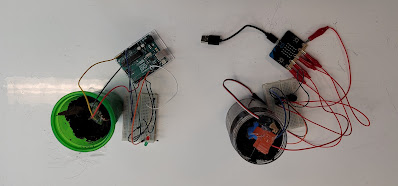Experienced participants used the micro:bit's built-in radios and Arduino bluetooth or wifi adaptors. One team connected both types of microcontrollers using a Raspberry Pi microprocessor.
Other teams began exploring agricultural and environmental monitoring adaptations to familiar VEX, Parallax, Kiktronic, and other platforms int he Lab.Exploring Technical Careers and College, Programming, Engineering Design, Creative Robotics, and all Hands-On STEM Education Strategies
Virginia Tech's Innovation Campus Technical (CTE and STEM) Education and Workforce Development Programs is one of the longest-serving collaborators in the Qualcomm's highly regarded Thinkabit Lab program network, and home to Invention Virginia / Invention DC programs, and the aggregator for the Northern Virginia STEM Learning Ecosystem. The mission of our Thinkabit Lab and all of our STEM programs is to serve Washington, D.C. area students, teachers, administrators, parents, and collaborators in preparing the future technical workforce through career exploration and the hands-on electronic and programming foundations of IOT and Smart Cities, AI and robotics automation, sensors, actuators, data collection and analysis, and entrepreneurship and innovation.
In doing so, we are preparing our future STEM workforce and our increasingly diverse, technology-driven community in lifelong learning for jobs that may not yet exist. Our team will work with like-minded teams, organizations and individuals interested in promoting curiosity, innovation, creativity, and students’ self-actualization and self-determination.


